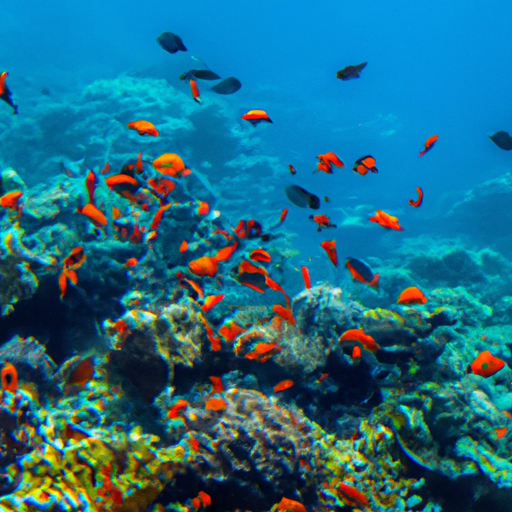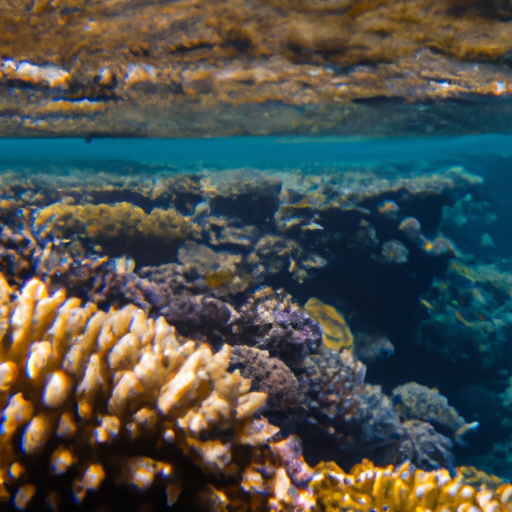
The Decline of Marine Life: Why Conservation Efforts are Crucial
Protecting marine life is of utmost importance in today’s world, as the decline of marine species has become a growing concern. The oceans cover more than 70% of the Earth’s surface and are home to a vast array of plant and animal life. However, human activities such as overfishing, habitat destruction, pollution, and climate change have taken a toll on marine ecosystems.
Conservation efforts play a crucial role in mitigating the negative impacts on marine life and ensuring the long-term survival of species and their habitats. These efforts involve the establishment of marine protected areas (MPAs), sustainable fishing practices, reduction of marine pollution, and raising awareness about the importance of marine conservation.
One of the key reasons why protecting marine life is essential is its role in maintaining global biodiversity. Marine ecosystems are incredibly diverse, supporting a wide variety of species, some of which are found nowhere else on Earth. By conserving these ecosystems, we preserve the genetic diversity and ecological balance necessary for the stability of our planet.
Furthermore, marine life plays a significant role in providing essential ecosystem services. For example, coral reefs act as natural barriers, protecting coastlines from erosion and reducing the impact of storms. They also support a multitude of fish species, contributing to the livelihoods of coastal communities through fishing and tourism.
Conservation efforts also ensure the sustainability of fisheries and protect endangered species. Overfishing has led to the depletion of numerous fish populations, disrupting the delicate balance of marine ecosystems. By establishing sustainable fishing practices and enforcing fishing regulations, we can ensure the replenishment of fish stocks and protect vulnerable species from extinction.
Additionally, protecting marine life is crucial for the economies of coastal communities and the global fishing industry. Many communities rely on fisheries as a source of income and food security. The decline of marine life can have devastating consequences for these communities, leading to unemployment and food shortages.
Lastly, marine ecosystems play a vital role in carbon sequestration and the regulation of climate. Oceans absorb a significant amount of carbon dioxide from the atmosphere, mitigating the impacts of climate change. By protecting marine life and preserving healthy ecosystems, we can enhance their capacity to sequester carbon and thus help combat climate change.
In conclusion, protecting marine life through conservation efforts is essential for biodiversity conservation, the provision of ecosystem services, the sustainability of fisheries, the prosperity of coastal communities, and climate regulation. It is crucial that governments, organizations, and individuals work together to prioritize marine conservation and ensure the future health and vitality of our oceans.
The Role of Conservation in Protecting Marine Ecosystems
The health and sustainability of marine ecosystems are of utmost importance for the well-being of our planet. These ecosystems are not only home to a rich diversity of marine life but also play a crucial role in regulating the Earth’s climate and providing essential resources for human populations. However, they are facing significant threats due to human activities such as overfishing, pollution, and habitat destruction.
Conservation efforts aimed at protecting marine life and preserving these precious ecosystems have become increasingly vital. Through various methods and strategies, conservationists strive to mitigate the negative impacts of human activities and create a more sustainable future for marine ecosystems.
One key aspect of marine conservation is the establishment and management of marine protected areas (MPAs). These designated zones provide a sanctuary for marine species to flourish without the threat of exploitation or destruction. MPAs serve as breeding grounds, nurseries, and feeding areas for a vast array of marine organisms, ensuring the preservation of biodiversity. By protecting key habitats, such as coral reefs, seagrass beds, and mangroves, MPAs contribute to the overall health and resilience of marine ecosystems.
In addition to establishing protected areas, conservation efforts also focus on sustainable fishing practices. Overfishing is a significant threat to many fish populations and can disrupt the delicate balance of marine food webs. Implementing measures such as fishing quotas, size limits, and gear restrictions help ensure the sustainability of fish stocks and protect marine biodiversity. Conservation organizations also work with local communities to promote alternative livelihoods, such as ecotourism, to reduce the reliance on destructive fishing practices.
Another critical aspect of marine conservation is the reduction of pollution and waste. Marine debris, including plastics, poses a severe threat to marine life, often causing entanglement, ingestion, and habitat degradation. Conservation efforts aim to raise awareness about the impacts of plastic pollution and promote responsible waste management practices. By reducing plastic consumption and implementing proper waste disposal systems, we can significantly minimize the negative effects on marine ecosystems.
Educating the public and fostering a sense of stewardship towards marine ecosystems is also a fundamental part of conservation efforts. By promoting marine literacy and encouraging sustainable behaviors, we can empower individuals to make informed decisions and take actions that benefit the health and vitality of our oceans. Through educational programs, public outreach campaigns, and partnerships with schools and communities, conservation organizations play a critical role in creating a more environmentally conscious society.
In conclusion, protecting marine life is an essential component of marine conservation efforts. By establishing marine protected areas, implementing sustainable fishing practices, reducing pollution, and educating the public, we can ensure the preservation of our marine ecosystems for future generations. It is imperative to recognize the interconnectedness of all life on Earth and work together towards a more sustainable and responsible relationship with our oceans.
Sustainable Fishing Practices: Ensuring a Healthy Future for marine Life
Protecting marine life is crucial for maintaining a healthy and sustainable ecosystem in our oceans. As our planet’s population continues to grow, the demand for seafood and other marine resources increases, putting immense pressure on our oceans and the creatures that inhabit them. Implementing conservation efforts is imperative to ensure the long-term survival and health of marine species.
Conservation efforts involve a variety of strategies aimed at preserving marine life and their habitats. One of the primary approaches is establishing protected areas or marine reserves where fishing and other activities are limited or prohibited. These protected areas act as safe havens for marine species, allowing them to reproduce, grow, and thrive without human interference. By safeguarding these critical habitats, we can help maintain and restore the diversity and abundance of marine life.
Another essential conservation effort is the regulation of fishing practices. Overfishing, where fish populations are depleted beyond sustainable levels, is a significant threat to marine ecosystems. To address this concern, sustainable fishing practices such as setting catch limits, implementing selective fishing techniques, and promoting responsible fishing methods are vital. These measures aim to ensure that fishing activities are conducted in a way that allows fish populations to replenish and maintain their natural balance.
Increasing public awareness and education about the importance of marine conservation is also crucial. Many people are unaware of the devastating impacts of their daily choices, such as purchasing unsustainably sourced seafood or products derived from marine species. By educating the public about the consequences of their actions and promoting sustainable alternatives, we can encourage individuals to make informed decisions that contribute to the protection of marine life.
Collaboration between governments, fisheries management organizations, and other stakeholders is vital for successful marine conservation efforts. The development and enforcement of regulations, as well as the implementation of monitoring and enforcement mechanisms, require cooperation and coordination. By working together, we can ensure that conservation measures are effectively implemented and enforced to protect marine life on a global scale.
In conclusion, protecting marine life through conservation efforts is essential for the long-term health and sustainability of our oceans. By establishing protected areas, regulating fishing practices, increasing public awareness, and promoting collaboration between various stakeholders, we can ensure a future where marine species thrive, and our oceans remain rich with biodiversity.
The Impact of Climate Change on Marine Life: Urgency for Conservation Efforts
Protecting marine life is of utmost importance in the face of the ever-increasing impact of climate change on our oceans. Conservation efforts play a significant role in preserving the delicate balance of marine ecosystems and ensuring their long-term survival.
One key reason why conservation efforts are crucial is because marine life supports a diverse range of species and provides habitats for countless organisms. Coral reefs, for example, serve as nurseries for fish and other marine species, while mangroves provide protection and food sources for various marine species. By establishing and maintaining protected areas, we can safeguard these critical habitats and preserve the biodiversity they harbor.
Furthermore, conservation efforts are essential for mitigating the negative effects of climate change on marine life. Rising ocean temperatures and ocean acidification pose significant threats to marine species. Coral bleaching, a phenomenon caused by warmer waters, leads to the loss of coral reefs, which are not only beautiful ecosystems but also home to a myriad of marine organisms. By implementing conservation measures, we can reduce additional stressors on marine life and give them a better chance of adapting to changing environmental conditions.
In addition to protecting marine biodiversity and mitigating the effects of climate change, conservation efforts also contribute to the sustainable management of marine resources. By implementing sustainable fishing practices and reducing overfishing, we can preserve fish stocks and maintain the delicate balance of marine ecosystems. This is crucial not only for the survival of marine species but also for the livelihoods of millions of people who depend on oceans for sustenance and income.
Furthermore, conservation efforts also raise awareness about the importance of protecting marine life and the urgency of addressing climate change. Education and outreach programs can help mobilize communities, policymakers, and businesses to take action and make sustainable choices that benefit our oceans and the life they support. By promoting a collective responsibility for marine conservation, we can create a positive feedback loop that leads to more comprehensive and effective conservation efforts.
In conclusion, protecting marine life through conservation efforts is essential for preserving marine biodiversity, mitigating the effects of climate change, ensuring sustainable resource management, and raising awareness about the importance of our oceans. With the urgency of climate change, it is crucial that we prioritize and intensify these efforts to secure the future of our marine ecosystems and the precious life they sustain.


